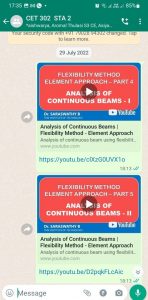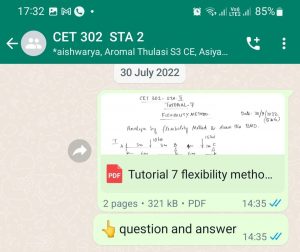- YouTube Channels of our Faculty
Dr. Saraswathy B
Learn Structural Engineering with Dr. Saraswathy B
- ICT enabled teaching and learning process
Information and Communication Technology (ICT) is the mode of education that uses information and communications technology to support, enhance, and optimize the delivery of information. ICT Enabled Teaching was introduced by Kerala Technological University. The concepts could be easily delivered with the help of this mode of teaching.
The Department of Civil Engineering started practicing this methodology from the beginning of 2016 itself. ICT registers were maintained for each batch of students. This mode of teaching improved the teacher-student interaction as well as provided the students an idea of presenting a topic with the help of PowerPoint presentations. Increase in the use of ICT in education with integrating technology to the curriculum has a significant and positive impact on students’ achievements. The students who are continuously exposed to technology through education, has better knowledge, presentation skills and innovative capabilities.
- Real World Exposure through Industrial Visit/ Training and Summer Internships
- E-learning videos and lectures
The subject oriented e-learning materials from SWAYAM/NPTEL/other MOOC courses are used for effective subject delivery. The field activity videos used in teaching helped the students to get an idea about the practical aspect also.
- Demonstration videos and lectures are uploaded in Linways, the institute’s online platform, to enable the students to access them at their convenience.
Linways, an academic management software was introduced in the academic year 2017-2018. The software provides a platform for teachers, students and parents to get actively involved in the academic activities. Faculty members can upload the course materials, give assignments, conduct online exams and quizzes and evaluate them using this platform.
- Students are encouraged to take up socially relevant and innovative projects through students’ forum activities.
Painting and renovation work were done at adopted colony in Kareepra, Ezhukone. Many volunteers participated in the work.

As part of Punarjjani work, volunteers did repairing and renovation works at the Primary Health Center, Ezhukone
- Training sessions in different software for planning, analysis and design are arranged for students.
Software training programs are organized by the Department of Civil Engineering to impart soft-skills to the students.
- Students are encouraged to participate in various inter institute events such as Technical fests, conferences etc. and are motivated to publish student projects.

- The practical knowledge of students is enhanced through virtual labs and additional facilities created in the laboratories.
The students were given awareness on the usage of Virtual labs to get more idea about the laboratory experiments relevant to the courses as part of collaborative learning. The experiments available in the virtual lab platforms beyond the syllabus were practiced for various laboratories and documented. With the advent of online classes, the virtual labs offered a highly effective platform for course delivery.

- Training in real-time applications like Open Street Mapping (OSM)
OSM Street mapping internship was a state level Mapathon internship program organized by the APJ Abdul Kalam Technological University’s NSS Cell. It was a two- month mapping program that aims at the learning and understanding of the OpenStreetMap (OSM) among people which was put forward by Kerala IT mission. As part of this, Civil Engineering students were given internship on open street mapping.

- Flipped Classroom (2021-2022)
With the flipped classroom approach, students obtain the initial information independently, at home, through the shared video contents. This enables them to get used to the process of self-study and allows them to learn at their own pace. With the flipped classroom model, students attend each class with the basic information and this allows more time to be dedicated to interactive learning, investigations, experimentation, and practical application.
The faculty members share the video links prior to the class and through this process, the students develop a better understanding of the topics through active learning.









